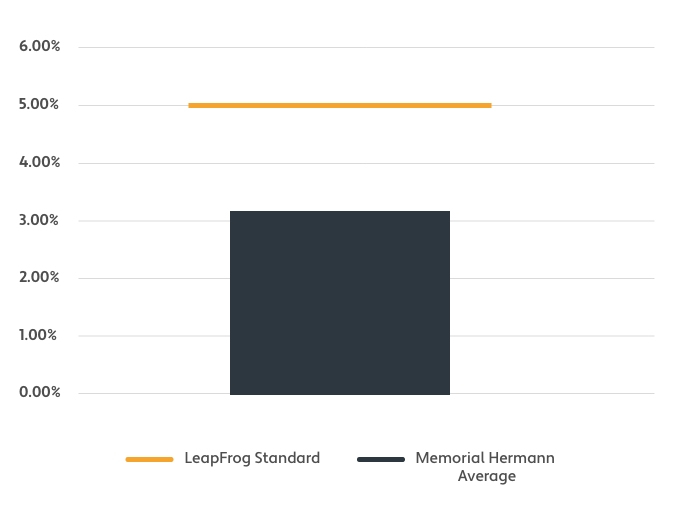U.S. News & World Report Best Hospitals Ranking
Children’s Memorial Hermann Hospital ranked as the No. 4 Best Children’s Hospital in Texas, and No. 5 in the Southwest Region in the recent 2022-2023 report. Children’s Memorial Hermann Hospital also ranked in the top 50 children’s hospitals in the nation for the following specialties:
- #29 Neurology and Neurosurgery
- #30 Cardiology and Heart Surgery
- #46 Gastroenterology and GI Surgery
- #47 Orthopedics
Memorial Hermann’s Women’s and Children’s Service Line is committed to improving the health of mothers and babies. That’s why we’re working with AIM, the Alliance for Innovation on Maternal Health (AIM). This national, data-driven maternal safety and quality improvement initiative has developed care bundles which specify well-established, evidence-based practices to help reduce maternal morbidity and mortality. These AIM bundles include care for:
- Obstetric Hemorrhage
- Severe Hypertension in Pregnancy
- Safe Reduction of Primary Cesarean Birth
- Cardiac Conditions in Obstetrical Care
- Care for Pregnant and Postpartum People with Substance Use Disorder
- Obstetric Care for Women with Opioid Use Disorder
- Postpartum Discharge Transition
- Sepsis in Obstetrical Care
Lowering the Episiotomy Rate
During childbirth, OB/GYNS sometimes perform an episiotomy as a way to enlarge the birth canal to help facilitate delivery. Currently, evidence has demonstrated that episiotomy shows no benefit in reducing complications like incontinence or pelvic floor weakness.
As part of a national effort to minimize this practice, Memorial Hermann has been successful in decreasing episiotomy rates at its hospitals, achieving a rate lower than the Leapfrog Standard from 2018 to 2023.
View episiotomy rates published on LeapFrog »
Episiotomy Rate
Women’s and Children’s Equity, Diversity & Inclusion Initiatives
Memorial Hermann is committed to improving the health of the communities we serve, including the health of women and children of all ages. Improving health begins with understanding and addressing the social determinants of health, the non-medical factors, including the economic and social conditions, that can influence health outcomes. One of our key areas of focus is reducing and ultimately eliminating maternal mortality and morbidity.
For laboring moms, severe maternal morbidity (SMM) is linked to serious underlying health conditions that can lead to pregnancy complications or even death. SMM also poses a health risk to the infant. Infants born to mothers with SMM are 39% more likely to die than those born to mothers without these health complications.
Every year, Memorial Hermann cares for more than 25,000 laboring mothers from every ethnic, economic and racial background and is committed to reducing, and ultimately eliminating, these racial and ethnic disparities. We are working with, and in, the communities we serve to understand and address the underlying causes of pregnancy-related complications, including the social determinants of health, which begin long before a woman becomes pregnant.
Neonatology
In 2013, House Bill 15 was passed to create level of care designations for hospitals that provide neonatal and maternal services. The purpose of the bill was to develop initial rules for neonatal/maternal level of care designation.
The Texas Department of State Health Services (DSHS) has the authority to designate facilities. The Office of EMS/Trauma Systems Section of DSHS works with hospitals, survey organizations and the Perinatal Advisory Council (PAC) to:
- Develop facility designation protocols,
- Develop policies, and
- Designate facilities in the state.
Neonatology Leveling by Level of Care
Memorial Hermann currently has 10 facilities designated as Neonatal Facilities. The following Memorial Hermann facilities are designated by Level of Care:
- Level IV:
- Memorial Hermann-Texas Medical Center / Children’s Memorial Hermann Hospital
- Level III:
- Memorial Hermann Katy Hospital
- Memorial Hermann Memorial City Medical Center
- Memorial Hermann Southwest Hospital
- Memorial Hermann The Woodlands Medical Center
- Level II:
- Memorial Hermann Cypress Hospital
- Memorial Hermann Greater Heights Hospital
- Memorial Hermann Northeast Hospital
- Memorial Hermann Southeast Hospital
- Memorial Hermann Sugar Land Hospital
Maternal Leveling
In 2013, House Bill 15 was passed during the 83rd Legislature, Regular Session. The purpose of the bill was to develop initial rules for level of care designations for hospitals that provide maternal services.
The Texas Department of State Health Services (DSHS) has the authority to designate facilities. The EMS/Trauma Systems Section of DSHS works with hospitals, Perinatal Care Regions (PCRs) and the Perinatal Advisory Council (PAC) to:
- Improve maternal patient care and outcomes,
- Develop hospital requirements for facility designation, and
- Establish regional coordination of maternal care.
Maternal Leveling by Level of Care
Memorial Hermann currently has 10 facilities designated as Maternal Facilities. The following Memorial Hermann facilities are designated:
- Level IV
- Memorial Hermann-Texas Medical Center / Children’s Memorial Hermann Hospital
- Level III
- Memorial Hermann Memorial City Medical Center
- Memorial Hermann Southwest Hospital
- Memorial Hermann The Woodlands Medical Center
- Level II
- Memorial Hermann Cypress Hospital
- Memorial Hermann Greater Heights Hospital
- Memorial Hermann Katy Hospital
- Memorial Hermann Northeast Hospital
- Memorial Hermann Southeast Hospital
- Memorial Hermann Sugar Land Hospital
